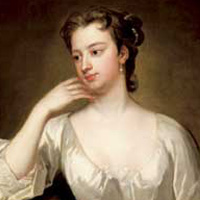Lady Mary Wortley Montagu - Biography and Works
Lady Mary Wortley Montagu was an English letter writer and a poet who was from the aristocratic family of father Evelyn and mother Mary Pierrepont. As she was denied from the formal education for being a woman, she was educated at home. She learnt Latin in her father’s library. She was influenced by John Dryden and French Romanticism as like that of her other contemporary writers.

Lady Mary W. Montagu (1689-1762)
Lady Mary Wortley Montagu was best known as a writer of letters, but she normally loved to refer herself as a 'poet.' Montagu generally borrowed the forms of Augustan verse which includes satires, verse epistles, mock epics, and songs. Today she is famous for the letters written from the Turkey. These letters are considered as the first secular work by a woman writer about the Muslim Orient. She also wrote political periodical Nonsense of Common Sense, and Six Town Eclogues. Most of her poems are collected in Anthony Hammond's New Miscellany of Original Poems, Translations and Imitations, by the most Eminent Hands (1720). Some of her poems and letters were published in her lifetime in newspapers, in magazines and in miscellanies.
She was strongly influenced by Ovid in her poetry, especially by his Heroides that analyses the 18th century sexual inequality. Her one of the best work is ‘Epistle from Mrs. Onge to Her Husband’ where a woman is accused of doing adultery. She was lashed out by her husband as a punishment and he also received money from her as a fine. She vehemently criticizes the patriarchal system of keeping women as the slave in marriage. Using Heroides she depicts the sufferers of class difference and sexual abuse. Her victims are not always females, but also male. In ‘Epistle From Arthur G[ra]y to Mrs. M[urra]y’ she presents a worker who was accused of raping the master’s sister and his love proposal was denied because of his social class.
As she was from an aristocratic family, her works and thoughts are different from other female writers of her era. She did not speak for the equality and the equal right to education as her contemporary female writers did. Earlier, some critics labeled her poetry as ‘masculine’. She got married to Edward Wortley Montagu but because of his possessive nature, she suffered a lot and the marriage proved disastrous to both. Joseph Addison, one of her husband’s friends introduced her to other poets of the era and she started writing criticism on poetry. Her criticism on Addison’s Cato, though unpublished, was very fruitful for Addison. He made many changes as per the criticism of Lady Mary.
She introduced the system of inoculation against smallpox, which was unprecedented in the medical field. Her own brother died of smallpox and she also suffered from it which damaged her beauty. During her stay in Turkey with her husband for two years, she saw the practice of inoculation against smallpox. After returning to London, she introduced the procedure, though she had to face many criticisms as the process of inoculation was an oriental process.
